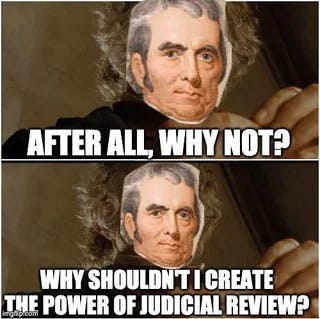Constitutional crises
But with a little c
Clearly, our national constitution is changing. This administration is smashing norms, and even this week, the Supreme Court will hear cases whose decisions could have lasting impacts.
The idea that our constitution is changing can be confusing for Americans, who use the word “Constitution” almost exclusively with a capital C, to refer to the written Constitution. I suspect this confusion comes from the fact that the US has the world’s oldest written constitution, one which we can amend (or, used to amend) but never changed wholesale via a constitutional convention. (Contrast this with, for example, the United Kingdom, which has no written constitution; France, which has had 16 written constitutions; and the Dominican Republic, which has had more than 30.)
How do we think about changes to the little-c constitution that aren’t formal amendments to the capital-C Constitution? To understand where things are going, let’s look back.
In an archaic sense, the constitution is how the body politic is constituted, how it is put together. It is the supreme law in the sense that it fills in all the gaps left by other kinds of laws. Even the word “law” can be thorny. Again, as Americans, we tend to have a narrow view of this word, reading “law” as federal statutes, specifically, the US Code, and the corresponding state and local statutes.
There are probably hundreds of definitions of “law” and “constitution,” but for our purposes here, think of “the law” as the socially accepted system for formal, nonviolent conflict resolution, and the “constitution” is the supreme law.
Consider a few crucial examples of our little-c constitution that aren’t part of our big-C Constitution. First, and most importantly, is the Supreme Court’s ability to declare laws unconstitutional. As a child, I learned that the Founding Fathers designed a government with three branches that had checks and balances against each other. This is a post hoc explanation. The Supreme Court’s ability to strike down Congress’s and states’ laws as unconstitutional is nowhere in the Constitution, not in the original text and not in any amendments. The Supreme Court itself decided, in a Supreme Court case, that it could declare laws unconstitutional, 14 years after the Constitution was ratified. The Court had to be clever about getting this decision enforced, navigating a conflict between political parties, coming to a decision that the party in power wanted to enforce, but for reasons that strengthened the Court. It was, in a sense, a mini-coup.

There are hundreds of more examples where Supreme Court or other case law are crucial, such as rules for federal executive decisionmaking from Chevron (overturned by Loper Bright) and for determination of unwritten constitutional rights from Roe (overturned by Dobbs).
Second, consider the House and Senate rules, which determine how Congress operates and thus have immense impacts on our lawmaking. Most notably, the filibuster, which essentially requires a supermajority for most laws to pass the Senate, is nowhere in the Constitution (beyond the part where the Constitution says that Congress can make its own rules). Congress has toyed with removing the filibuster for at least 20 years.
Third, there are countless examples of small things that are just “the way we do things,” things that UK lawmakers would firmly call part of their constitution but which we, as Americans, don’t know how to name. Defeated presidential candidates are expected to concede the election. Presidents are expected to release their tax returns and divest themselves of any remotely problematic investment. Federal agencies are expected to spend money that Congress has appropriated.
In a sense, each of these things —a Supreme Court decision, the Senate’s “nuclear option,” unprecedented Presidential actions— is a constitutional crisis. Some crises are more acute or more important than others, but they are all constitutional crises, even if they don’t directly involve someone directly flouting the Constitutional text.
I don’t use “crisis” in an alarmist sense. Again, looking back, “crisis” comes from an ancient Greek word meaning “decision.” The word originally came into English to refer to the deciding moment in the course of a disease, when a patient’s fever would either peak and fall, or not.
But while every crisis is a decision, not every crisis is life or death. Our constitution is clearly changing in a way that grants more latitude to the party in power with respect to unwritten constitutional norms and, potentially, with respect to actual written laws.
This need not signal immediate disaster. As an American learning about Greek politics, I was mortified to learn that, in the Greek system, the ruling party substantially changes election law with each major transition in power between parties, essentially gerrymandering the whole country. And yet, they have traded between relatively conservative and liberal parties multiple times since their civil war and subsequent junta.
Elections are still real, at least for now.

